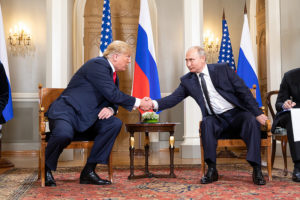
President Donald J. Trump and President Vladimir Putin of the Russian Federation | July 16, 2018 (Official White House Photo by Shealah Craighead)
At The American Conservative, Professor Michael C. Desch, director of the Notre Dame International Security Center, explains that, while Russia certainly has its problems today, it is nowhere near as bad or as threatening as it was during the Soviet era. Russian violence has only come as a reaction to prodding by America on the Federation’s periphery, as most recently expressed by Victoria Nuland pushing protesters in Ukraine to take down the Russian backed government. You can read more comparing Russia to the U.S. here. He writes (abridged):
Putin might be loud and disruptive, but he’s hardly the neo-Soviet menace that many Westerners see.
Russia is no longer the totalitarian state that the Soviet Union was under Josef Stalin. Communism killed millions during the Soviet period; lethal political violence in Putin’s Russia is deplorable but relatively rare, the murders of a few journalists, political opponents, and defectors notwithstanding.
Russia has employed military force against its neighbors twice in recent years. In 2008, it fought a short but sharp war against the former soviet republic of Georgia, and in 2014 it seized the Crimean Peninsula in a largely bloodless occupation and then ratcheted up a proxy rebellion of pro-Russia separatists in the Donetsk region of Eastern Ukraine.
Two points to keep in mind here: first, in both cases, Russian moves were not unprovoked bolts from the blue. Rather, they were responses—albeit excessive and illegal—to efforts by NATO and the European Union to draw former Soviet republics further into the West’s orbit. Second, Russian aims were limited and showed little indication of being the first shots in a longer campaign to recreate the Soviet Union or the Warsaw Pact, whether by blood, iron, or electrons.
From Moscow’s perspective, the events in Kiev in late 2013 and 2014, in which the pro-Russian but democratically elected President Viktor Yanukovych was ousted before the next round of elections, looked suspiciously like a Western-backed coup. The fact that a U.S. State Department official, Victoria Nuland, was cheering the Maidan rebellion on from the streets (while serving tea and cookies) certainly smacks of American election meddling.
The only category in which the Europeans are at a disadvantage vis-à-vis the Russians is nuclear weapons (.11 to one). But recent scholarship has shown that even a large advantage in nukes does not translate into coercive leverage.For example, just a handful of Soviet nuclear weapons during the Cuban Missile Crisis offset massive U.S. nuclear superiority and led President Kennedy to try to end the crisis through diplomacy rather than combat.
Despite President Trump’s chummy summit with Putin in Helsinki, something is rotten in the Kremlin. The West is right to regard Putin’s Russia as a strategic problem to be managed. But we should not lose sight of the fact that even the authoritarian regime occupying the Kremlin today is a far cry from the totalitarian and mass-murderous governments of the Soviet period.
Read more here.
If you’re willing to fight for Main Street America, click here to sign up for my free weekly email.





